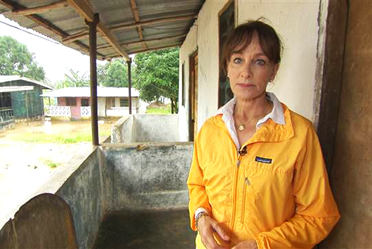Nancy Snyderman Quarantined After Crew Member Contracts Ebola


SNYDERMAN BACK FROM LIBERIA: NBC News Chief Medical Editor and Correspondent Dr. Nancy Snyderman returned from Liberia on Monday after a cameraman on her team tested positive for the Ebola virus last Thursday. Her co-worker is being treated at the University of Nebraska Medical Center. Ms. Snyderman and the rest of her team were described by NBC News President Deborah Turness yesterday as “feeling well and in good health.” They will be staying in their homes monitoring their temperatures twice daily and staying in touch with the local health authorities for the remainder of the recommended 21-day quarantine period.
Princeton resident and NBC News Chief Medical Editor and Correspondent Dr. Nancy Snyderman had to be flown back from Liberia where she had been reporting on the Ebola outbreak in Monrovia when a cameraman on her team tested positive for the disease last Thursday.
The cameraman, named as Ashoka Mukpo, is the fourth American to have contracted Ebola in Liberia. The 33-year-old photo-journalist from Rhode Island was hired as a second cameraman on Dr. Snyderman’s team on Tuesday of last week. When he felt unwell on Wednesday, a routine temperature check showed a higher than normal reading. The help of Medicins Sans Frontieres doctors was immediately sought and he was tested for the disease and found positive for the virus on Thursday. By Sunday, he was on his way home to the United States on a specially equipped jet from Liberia to the University of Nebraska Medical Center for treatment. He is the second person with the Ebola virus to be treated at the University of Nebraska Medical Center.
According to NBC News President Deborah Turness, the cameraman had worked in Liberia for the past three years and had recently been covering the epidemic for U.S. media. The rest of the crew, including Ms. Snyderman, are being closely monitored and show no symptoms or warning signs. As a precautionary measure, they are being quarantined for 21 days.
Ms. Snyderman has been reporting on the precautions being taken to prevent the spread of the disease. The strict safety protocols include wearing plastic suits, gloves and goggles when visiting hospitals where victims are being treated and at other times spraying shoes with bleach, monitoring body temperature at least twice a day to check for elevated temperature that is one of the first signs of the disease, and washing hands frequently with a sanitizer.
On Monday, she was seen on NBC taking the precautions that she said have become “a way of life” in Liberia, where officials are vigilant about monitoring people’s temperatures at the airport, at hotels, and for those traveling between towns.
“Greetings are done at a distance, no handshakes, no hugs,” reported Ms. Snyderman. “For healthcare workers, layers of protective equipment are required. It’s a painstaking process.” The medical correspondent was shown visiting a patient in a local clinic and then removing her plastic protective suit, gloves and goggles afterwards. The removed items were hosed down with a bleach solution before being incinerated. “It’s a meticulous process,” she said.
Ms. Snyderman and the rest of her team returned to the United States Monday. All were ”feeling well and in good health,” said NBC News President Deborah Turness in a statement sent to staff members on Tuesday. “While they are deemed to be at low risk, we have agreed with state and local health authorities that our team will not come to work, and they will stay at home taking their temperatures twice daily and staying in touch with the local health authorities for the remainder of the recommended 21-day period.”
“Sadly this epidemic shows no signs of slowing down, adding to the social disintegration of Liberia,” said Ms. Snyderman before she left Liberia. “But we start this 21-day quarantine with the firm belief that we will come out the other end okay and we believe that our co-worker is also going to be fine. We want the eyes of the world to remain on Liberia,” she said. “And we will be back to continue to cover this story.”
American aid workers Dr. Kent Brantly and Nancy Writebol were infected in July while working for Samaritan’s Purse in Monrovia. Last month, Dr. Rick Sacra was diagnosed with the virus after working at a local hospital in Liberia. Liberian national Thomas Eric Duncan is currently being treated for Ebola at a hospital in Dallas.

Eli Waller
A Virus Closer to Home
A Mercer County preschooler is New Jersey’s first confirmed death linked to the Enterovirus D68 (EV-D68) a serious respiratory illness that has swept the country the last several weeks. According to the Centers for Disease Control and Prevention (CDC), 594 people across 43 states and the District of Columbia have been made ill by this virus since mid-August and it has been detected in four people who have died.
Mercer County officials reported that tests results showed that four-year-old Eli Waller, who died in his sleep on September 25, had the virus.
The child, a student at Yardville Elementary School in the afternoons, had gone to bed with what appeared to be “pink eye,” or conjunctivitus. Apparently, he showed showed none of the typical signs associated with the disease such as coughing, a runny nose, body and muscle aches and, sometimes, fever. A second student at the school, who has shown such symptoms, has been tested for the virus, which is spread through close contact with infected individuals, objects and surfaces. There is no vaccine.
So far, nine cases of ED68 have been confirmed by the New Jersey State Department of Health, in eight counties: Burlington, Camden, Essex, Mercer, Middlesex, Morris, Passaic and Sussex. Princeton’s Health Officer has posted links to the New Jersey Department of Health on the municipal website, where you will also find the fact sheet, “Enterovirus-D68 (EV-D68) Frequently Asked Questions:” http://princetonnj.gov/health/9_29_14_EV-D68_FAQ_GENERAL_105180.pdf:
For more information, visit the NJ Department of Health: www.nj.gov/health/cd/ev-d60/index.shtml, and the CDC: www.cdc.gov/non-polio-enterovirus/outbreaks/EV-D68-outbreaks.html

